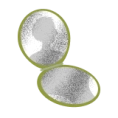
Caring For Your Skin Through Genetics

Understanding The Genetic Analysis Of The Skin
Introduction
The skin, our largest organ, plays an important function in protecting us from external aggressions and preserving our internal balance.
Genetic analysis, most notably in the field of dermatology, has revolutionized our understanding of skin health. As a matter of fact, through the analysis of an individual's DNA blueprint, we can learn more about their skin's unique characteristics, vulnerabilities, and optimal skin care strategies.
The following sections are intended to give you a comprehensive understanding of your skin's genetic blueprint.
Skincare
Skincare is profoundly shaped by genetics, defining individual skin characteristics and responses to external factors, and thus fulfilling a pivotal role in preserving skin health and preventing harm.
- Skin sensitivity: Genetic factors contribute to skin sensitivity, as seen in conditions such as atopic dermatitis (AD), commonly known as eczema. This chronic inflammatory skin disorder causes dry, itchy skin and is strongly determined by genetic variations. Indeed, mutations in the filaggrin gene (FLG) have been identified as a major risk factor for the onset of AD. These mutations can impair the skin's natural barrier function, resulting in an increased sensitivity to environmental irritants and allergens. In addition, other genes involving immune system function are believed to also contribute to the pathogenesis of AD, which further highlights the genetic basis of skin sensitivity in this disease.
- Antioxidant capacity: The skin's natural capacity to produce antioxidants, agents that help protect the skin from oxidative stress and damage, is also determined by genetics. This function is vital in preventing premature aging and preserving skin health. Genetic variations can interfere with the expression and effectiveness of antioxidant enzymes such as superoxide dismutase and glutathione peroxidase, both of which are essential for neutralizing free radicals.
- Skin inflammation: Skin inflammation is a natural response that helps repair skin after exposure to allergens, toxins, and environmental stressors such as UV rays. While acute inflammation is beneficial in the short term, chronic inflammation can be harmful and cause premature skin aging. Several stimuli, such as stress, tobacco and pathogen infection, can trigger chronic inflammation. And as stated previously, genetic variations have been shown to contribute to the skin's inflammatory response, contributing to conditions such as psoriasis and atopic dermatitis. Certain genetic markers modulate the immune response, leading to sustained inflammation and overproduction of skin cells. The balance of pro-inflammatory and anti-inflammatory genes determines the risk of chronic inflammation, with symptoms including skin tenderness, redness and irritation.
- Varicose veins: Genetics play a major part in the pathogenesis of varicose veins, with specific gene variations being linked to their occurrence. Weakening of vein walls and valves, a leading cause of varicose veins, appears to be hereditary, putting those with such a family history at increased risk.
- Protection against glycation: Glycation, a process leading to skin aging through collagen and elastin breakdown, is modulated by genetic variations in sugar metabolism and protein protection genes. This process leads to advanced glycation end products (AGEs), which are responsible for skin wrinkles, dryness and loss of firmness. AGEs tend to build up with age and are further amplified by UV exposure. Controlling blood sugar levels and maintaining a healthy diet can help slow glycation, while genetic variations, such as in the GLO1 and AGER genes, can impact one's predisposition to glycation-related skin aging.
- Protection from pollution: In some individuals, genetic variations may confer increased protection against environmental pollutants, specifically in genes involved in detoxification and antioxidant defense. For instance, EPHX1 and NQO1 enzymes are known to play a crucial role in protecting the skin from harmful chemicals such as epoxides and quinones. While EPHX1 converts epoxides into less reactive forms, NQO1 detoxifies quinones and helps generate antioxidants such as ubiquinol. However, genetic variations causing deficiencies in these enzymes can greatly reduce protection against environmental toxins, increasing the risk of skin damage and aging.
- Acne, freckles, psoriasis and cellulitis: Whether a person will eventually develop skin conditions such as acne, freckles, psoriasis, and cellulitis is strongly determined by genetic factors. Specific genes have been identified with each condition, affecting susceptibility and severity. As an example, genetic variations in the melanocortin-1 receptor (MC1R) gene can increase the risk of developing freckles and affect skin pigmentation.
Sun and Skin
Sun exposure is an important contributor to skin health, with genetics influencing the skin's response to UV radiation and its natural capacity to resist sun damage:
- Sun Sensitivity: Individual genetic variations are major determinants of one's skin's sensitivity to UV exposure, thus influencing the risk of sunburn and skin cancer. Several factors, such as skin development stage, inflammation due to conditions such as atopic dermatitis, photosensitivity resulting from medications, and inherent skin type, call for the use of an adequate sun protection factor (SPF). Several studies have identified genetic variations that increase sun sensitivity and the likelihood of sunburn. Genes linked to skin pigmentation, such as ASIP, TYR, MC1R, and OCA2, are major contributors to sun sensitivity, whereas DNA repair genes are strongly correlated with sunburn susceptibility, implying a mechanism rather unrelated to pigmentation.
- Sunspots: specific genes such as MC1R and IRF4 have been found to be linked to increased sunspot vulnerability. Facial sunspots, also known as solar lentigines, are pigmented patches resulting from localized growth of melanin-producing cells due to UV exposure. These spots are commonly found on aging skin and are more prevalent in Caucasian and Asian populations, particularly in women over the age of 50. Although they are benign and do not require medical treatment, their appearance is a sign of excessive sun exposure. Sunscreen use and sun exposure control are the best preventive measures.
- Ease of tanning and photoaging: Your skin's tendency to tan is determined by your genetic makeup, with specific genes regulating melanin production and skin pigmentation. Genetic factors also contribute to photoaging, the premature aging of the skin due to sun exposure. Photoaging is a result of prolonged exposure to UV radiation, which leads to DNA damage, oxidative stress and changes in the skin's connective tissue. It leads to uneven pigmentation, fine wrinkles, sagging skin and other signs of aging. Several studies have shown that photoaging is genetically driven, with variations in genes such as STXBP5L and FBXO40 being correlated with an overall photoaging score that includes pigmentation irregularities, wrinkles and sagging skin.
Feed Your Skin
Nutrient deficiencies can greatly affect skin health, and your genetics play a significant role in the absorption and metabolism of essential vitamins and fatty acids:
- Vitamin B9 (folate): Folate is crucial for DNA repair and cell division, both of which are important processes in maintaining healthy skin. Folate deficiency can lead to skin damage and signs of aging. Certain genetic variants in the MTHFR gene can lead to low plasma folate levels and are linked to conditions such as varicose veins.
- Vitamin B12 (cobalamin): Vitamin B12 is vital for healthy skin cells and in reducing inflammation. It interacts with folate to lower homocysteine levels, which, at increased levels, are correlated with skin conditions such as oral atrophy and hyperpigmentation. There is also a genetic variant in the FUT2 gene that has been linked to low blood levels of vitamin B12.
- Vitamin C (ascorbic acid): Vitamin C is a powerful antioxidant that helps protect the skin from oxidative stress and supports collagen production. Vitamin C deficiency can result in symptoms such as easy bruising, dry skin, and poor wound healing. Topical application of vitamin C may help improve signs of photoaging, including wrinkles and sagging skin. Genetic variations in the SLC23A1 gene have been shown to be linked to lower levels of vitamin C in the blood.
- Vitamin D: Produced in the skin after exposure to UVB rays, vitamin D is known to be involved in several skin conditions, including psoriasis and atopic dermatitis. Proper levels of vitamin D can improve skin elasticity, immunity and glow. Several genetic variations have been linked to vitamin D deficiency.
- Vitamin E: Vitamin E, primarily α-tocopherol, boosts the immune system and protects the skin from UV radiation and inflammation. Insufficient levels can lead to skin ulcers and increased collagen loss. When taken with vitamin C, vitamin E can reduce inflammation due to UV radiation and lower vulnerability to sunburn. A genetic variant near the APOA5 gene has been shown to be correlated with increased plasma α-tocopherol levels.
- Omega-3 and omega-6 fatty acids: These essential fatty acids are important for the heart, brain, anti-inflammatory response, and aging. Reduced levels can lead to skin conditions such as dermatitis, acne, and psoriasis. Omega-3s protect against UV-induced skin damage and reduce inflammation. Although our daily intake of omega-6 fatty acids is generally adequate, it may be insufficient for omega-3 fatty acids, which is why supplementation may be beneficial. A genetic variant of the FADS1 gene has been associated with low levels of omega-3 and omega-6.
Conclusion
Examining your skin from a genetic perspective can provide valuable insights into your skin's genetic predispositions, helping you tailor your skincare routine and lifestyle choices to optimize your skin's health and appearance.
By understanding the unique aspects of your genetic makeup, you can take proactive steps to nurture and protect your skin, ensuring its vitality and resilience against various environmental and intrinsic factors.
Skincare Test

This test provides information on your skin type and the care it requires based on your genetic profile.
Adnà's Input
Our genetic makeup influences how our skin ages, and our environment also plays an important role in skin health. A healthy diet and lifestyle contribute to the health of your skin, and the Adnà Skin Care Test can serve as a valuable tool in the development of your skin care routine.
Other Journal : Files
VIEW MORE


